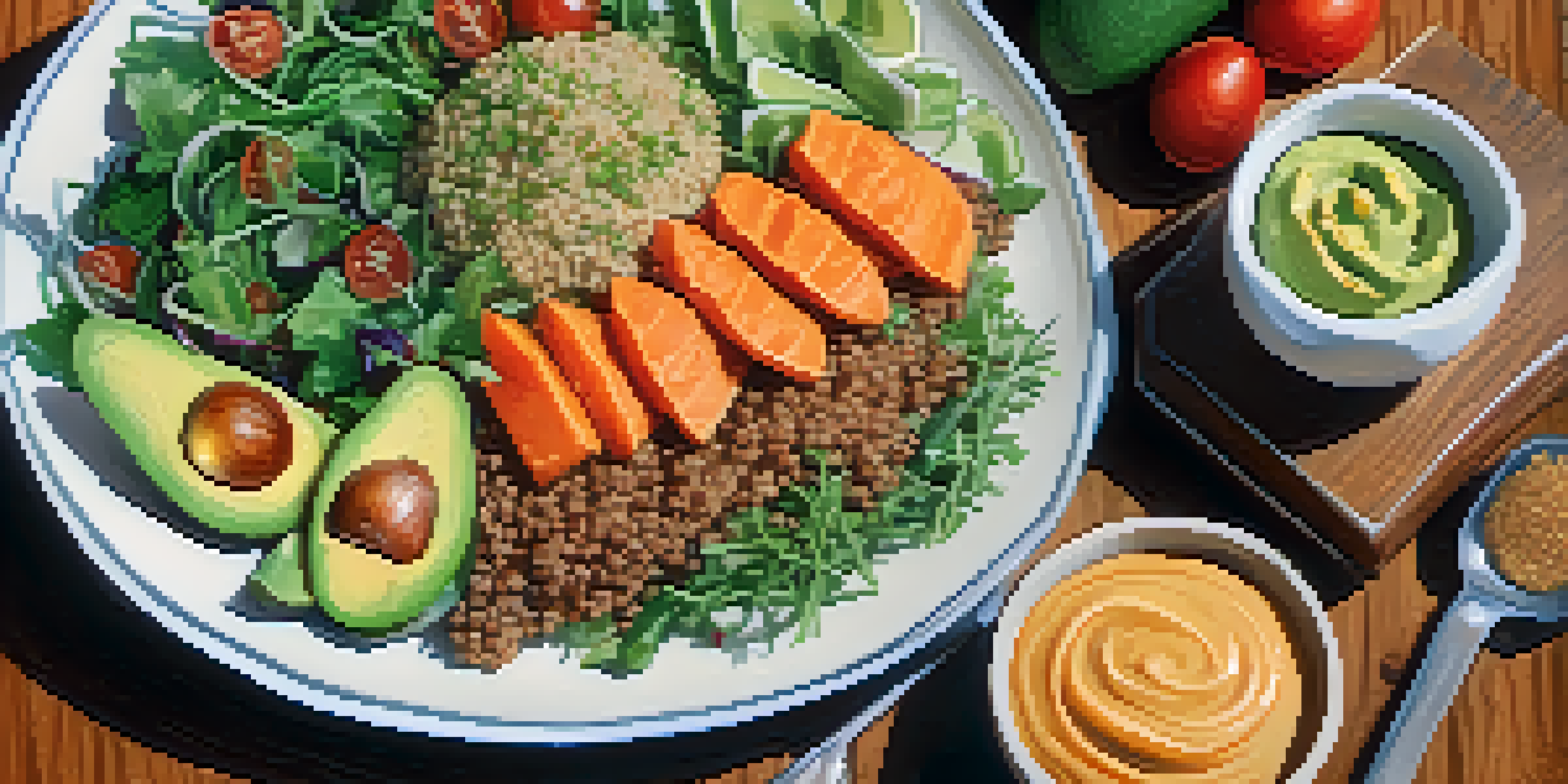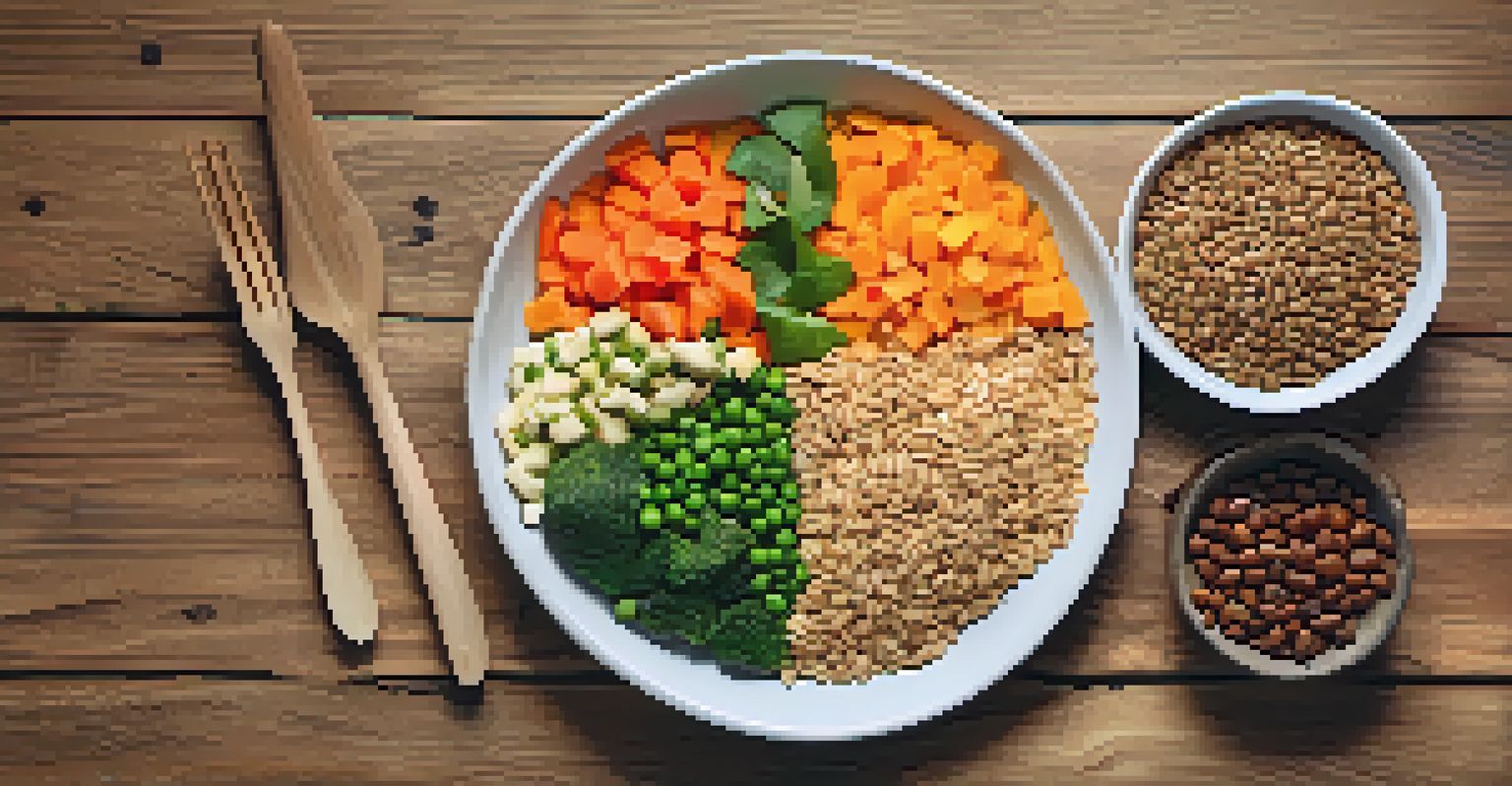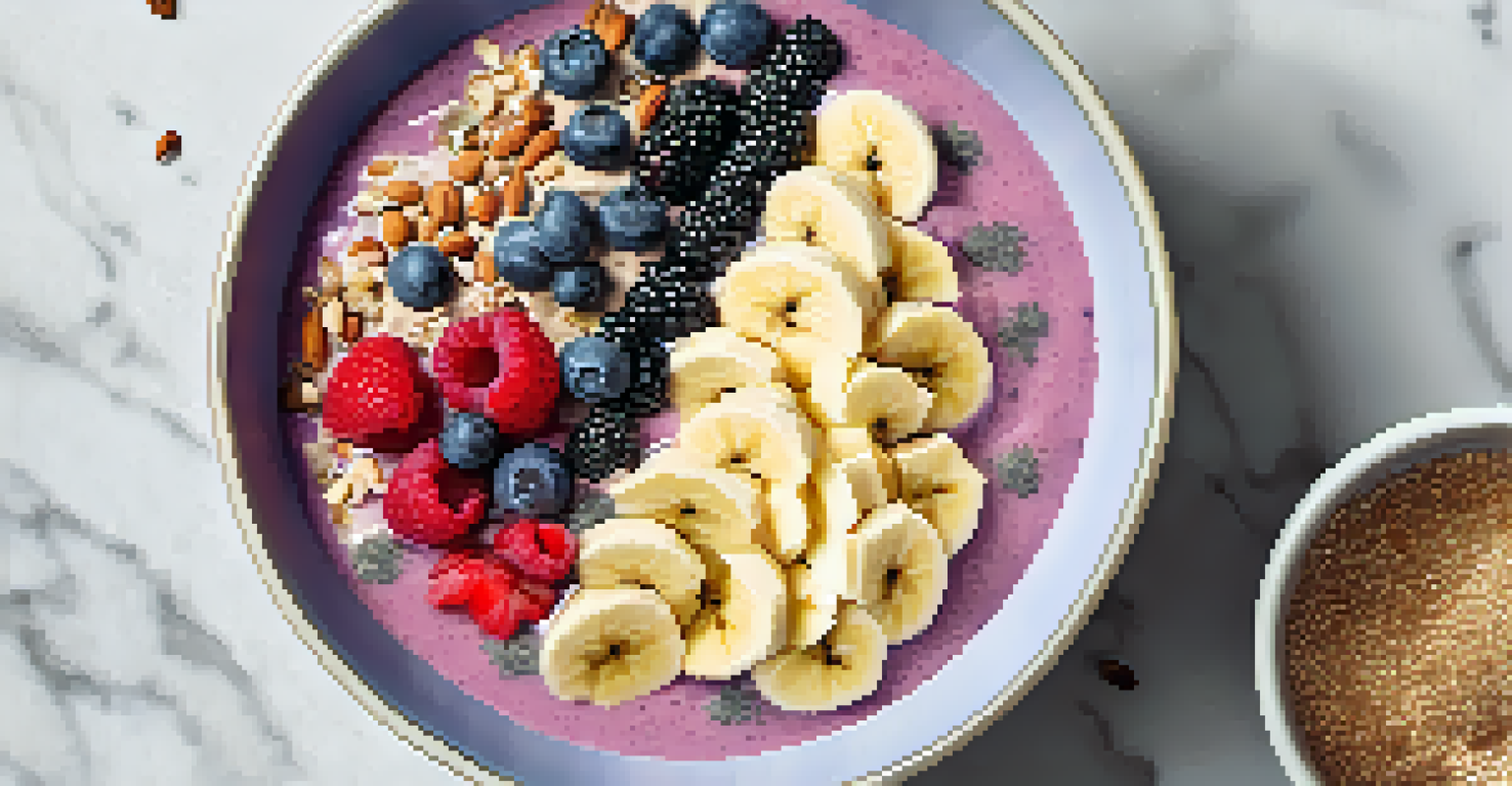Balancing Macronutrients in a Vegan Diet for Weight Control

Understanding Macronutrients: Carbs, Proteins, and Fats
Macronutrients—carbohydrates, proteins, and fats—are crucial for our health and energy levels. Each plays a unique role in our body, contributing to everything from energy production to muscle repair. For vegans, understanding how to balance these macronutrients is essential for maintaining a healthy weight and overall well-being.
Let food be thy medicine, and medicine be thy food.
Carbohydrates are typically the body's primary source of energy, found in foods like grains, fruits, and vegetables. Proteins are vital for muscle repair and growth, and they can be sourced from beans, lentils, and tofu. Fats, while often misunderstood, are necessary for hormone production and nutrient absorption, with healthy options including avocados, nuts, and seeds.
Balancing these macronutrients can seem challenging, especially on a vegan diet, but it’s all about knowing your sources and portion sizes. By understanding how each macronutrient functions, you can create meals that fuel your body, support weight control, and keep you feeling satisfied.
The Role of Carbohydrates in a Vegan Diet
Carbohydrates often get a bad rap, but they are an essential part of any diet, including vegan. They provide the energy needed for daily activities and workouts. The key is to focus on complex carbohydrates, such as whole grains, beans, and vegetables, which release energy slowly and help keep you full longer.

Processed carbs, like white bread and sugary snacks, can lead to weight gain if consumed in excess. Instead, think of carbs as your body's fuel source; they power your brain and muscles. Including a variety of colorful fruits and vegetables not only enhances your diet but also offers vitamins and minerals that are vital for overall health.
Balance Macronutrients for Health
Understanding and balancing carbohydrates, proteins, and fats is essential for maintaining a healthy weight and overall well-being on a vegan diet.
To maintain a healthy weight, aim for a balanced intake of carbohydrates that supports your energy needs without going overboard. Monitor portion sizes and listen to your body’s hunger cues to ensure you're fueling your body appropriately.
Importance of Protein in Vegan Weight Control
Protein is a crucial macronutrient that plays a significant role in weight control, especially for vegans. It helps build and repair tissues while also keeping you feeling full, which can reduce overall calorie intake. The good news is that there are plenty of plant-based protein sources available.
You are what you eat, so don't be fast, cheap, easy, or fake.
Foods like lentils, chickpeas, quinoa, and nuts provide excellent protein options. Incorporating a variety of these sources can help you meet your protein needs without the excess calories. It's also essential to spread your protein intake throughout the day to maximize muscle synthesis and satiety.
Keep in mind that while protein is important, balance is key. Too much protein, especially from processed sources, can lead to nutritional imbalances. Instead, aim for a well-rounded plate that includes a mix of proteins, carbs, and healthy fats.
Healthy Fats: Essential for a Vegan Diet
Fats are often misunderstood, yet they are essential for a balanced diet. Healthy fats support brain function, hormone production, and the absorption of fat-soluble vitamins. On a vegan diet, you can find healthy fats in avocados, nuts, seeds, and olive oil.
Incorporating healthy fats into your meals can also enhance flavor and satisfaction, making it easier to stick to your dietary goals. However, it’s important to monitor portion sizes, as fats are calorie-dense and can lead to weight gain if eaten in excess.
Healthy Fats Are Essential
Incorporating healthy fats from sources like avocados and nuts supports brain function and nutrient absorption while aiding in weight management.
Aim to include healthy fats in moderation, balancing them with your carbs and proteins for optimal health. Finding the right ratio of macronutrients can help you maintain a healthy weight while enjoying delicious vegan meals.
Creating Balanced Vegan Meals: Practical Tips
Creating balanced meals on a vegan diet is simpler than it sounds. Start by filling half your plate with colorful vegetables, a quarter with whole grains, and the remaining quarter with a protein source. This method ensures you're getting a variety of nutrients while keeping your meals satisfying.
Incorporating healthy fats can be as easy as adding a tablespoon of nuts or seeds to your salads or smoothies. Experimenting with different recipes and ingredients can make your meals exciting and help you discover new favorites. Remember, variety is key to getting all the nutrients your body needs.
Planning your meals ahead of time can also help you maintain this balance. By prepping your meals, you can ensure each one includes the right mix of macronutrients, making it easier to stay on track with your weight control goals.
Monitoring Your Macronutrient Intake
Tracking your macronutrient intake can be beneficial for understanding how your diet affects your weight. There are various apps and websites available that make it easy to log your food and see how much of each macronutrient you're consuming. This practice can help identify areas for improvement.
By keeping an eye on your protein, carbohydrate, and fat intake, you can make adjustments as needed to support your weight goals. For instance, if you find you're not getting enough protein, you might add more legumes or tempeh to your meals.
Monitor Your Macronutrient Intake
Tracking your macronutrient consumption can help you make informed dietary choices that support your weight control goals.
However, remember that tracking doesn't have to be restrictive. It’s about informing your choices and helping you create a balanced diet that works for your lifestyle. Focus on progress rather than perfection, and enjoy the journey of discovering what fuels your body best.
The Benefits of a Balanced Vegan Diet for Weight Control
A balanced vegan diet can offer numerous benefits for weight control beyond just macronutrient balance. Whole plant foods are often lower in calories and high in fiber, which promotes feelings of fullness and can help prevent overeating. This makes it easier to manage your weight without feeling deprived.
Additionally, a plant-based diet is rich in antioxidants and phytochemicals, which can support overall health and well-being. By focusing on whole foods and minimizing processed options, you create a nourishing environment for your body that can lead to sustainable weight management.

Ultimately, the key to success lies in finding what works best for you. Everyone's body is different, so it may take some time and experimentation to discover your ideal macronutrient balance. Stay patient and embrace the journey toward a healthier you!